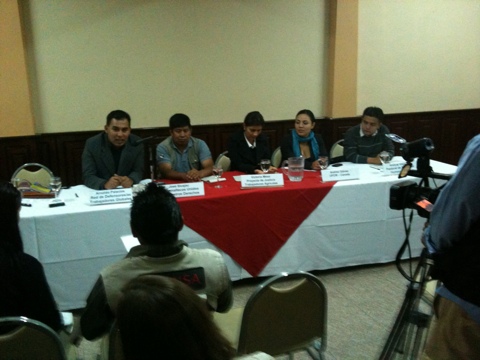COMMUNIQUÉ
Québec doit modifier sa loi et ses programmes en matière d’immigration pour mettre fin à la discrimination systémique des travailleuses et travailleurs migrants, selon la Commission des droits de la personne et des droits de la jeunesse
Montréal, le 20 février 2012 – La Commission des droits de la personne et des droits de la jeunesse demande au gouvernement du Québec de réviser sa législation et ses programmes en matière d’immigration pour mettre fin à la discrimination systémique dont sont victimes les travailleurs migrants.
Dans un avis rendu public aujourd’hui, la Commission conclut que les aides familiales résidantes, les travailleurs agricoles saisonniers et les autres travailleurs étrangers temporaires peu spécialisés sont victimes de discrimination systémique en raison de leur origine ethnique ou nationale, de leur race, de leur condition sociale, de leur langue et, dans le cas des aides familiales résidantes, de leur sexe.
« Notre avis expose clairement la situation de grande vulnérabilité dans laquelle se trouvent ces travailleurs migrants », a précisé le président de la Commission des droits de la personne et des droits de la jeunesse, monsieur Gaétan Cousineau. « Ce sont pourtant des personnes qui bénéficient de la protection de la Charte des droits et libertés de la personne au même titre que les résidents permanents ou les citoyens. Elles font partie du tissu social et contribuent à la vie économique du Québec. »
En 2010, le Québec a accueilli près de 7 000 travailleurs migrants peu spécialisés, dont la plupart étaient originaires du Guatemala, du Mexique et des Antilles qui ont été employés principalement dans le secteur agricole. De ce nombre, environ 400 aides familiales résidantes, en majorité originaires des Philippines, travaillaient dans des familles québécoises comme gardiennes d’enfant ou aides domestiques.
La Commission est d’avis que la vulnérabilité dans laquelle se retrouvent ces travailleurs migrants exerce une pression à la baisse sur les conditions de travail de l’ensemble des travailleurs qui œuvrent dans ces secteurs. D’ailleurs, en l’absence de travailleurs migrants, bien des employeurs québécois seraient obligés d’améliorer les conditions de travail insatisfaisantes dans ces domaines d’emploi.
Le gouvernement du Québec devrait viser la création d’un programme d’immigration permanente plutôt que temporaire et ainsi limiter le recours aux travailleurs migrants, selon la Commission. De même, cette dernière demande au ministère de l’Immigration et des Communautés culturelles de n’accepter que des travailleurs disposant d’un permis de travail sectoriel et d’interdire l’obligation de résider chez l’employeur. Cette obligation peut compromettre plusieurs droits protégés par la Charte, dont le droit à la vie privée et l’inviolabilité de la demeure. La constante disponibilité physique des aides familiales résidantes rend également difficile la distinction entre leur vie privée et leur vie professionnelle, ce qui peut compliquer, entre autres, le calcul du temps supplémentaire.
Présentement, en raison de leur statut d’immigration, les travailleurs migrants doivent détenir un permis de travail limité à un seul emploi et à un seul employeur qui les contraint aussi à demeurer chez leur employeur. Cela restreint, non seulement leur liberté d’établissement et leur accès au programme de regroupement familial, mais porte également atteinte à leur droit à la liberté et leur droit à des conditions de travail justes et raisonnables qui respectent leur santé, leur sécurité et leur intégrité physique.
En outre, comme les travailleurs migrants ont de la difficulté à établir leur résidence, ils sont exclus des programmes de protection sociale et n’ont pas droit, notamment, à l’aide juridique, à l’aide sociale, à l’instruction publique (à la discrétion des commissions scolaires) et aux programmes de soutien à l’intégration des immigrants, y compris les cours de francisation, alors que la majorité de ces travailleurs sont hispanophones ou anglophones.
« Une meilleure connaissance du français pourrait pourtant les aider à obtenir des résultats supérieurs dans la grille de sélection des travailleurs indépendants », précise l’avis de la Commission.
Par ailleurs, dans certaines circonstances, les travailleurs migrants sont exclus de certaines dispositions du Code de travail, de la Loi sur les normes du travail, de la Loi sur la santé et la sécurité du travail et de la Loi sur les accidents du travail et les maladies professionnelles. Par conséquent, ils n’ont pas droit aux mêmes conditions de travail et salariales que les travailleurs québécois qui font le même travail, particulièrement en ce qui a trait aux heures supplémentaires et aux congés payés.
Afin de prévenir les abus, la Commission recommande que le gouvernement du Québec encadre mieux les activités des agences de recrutement des travailleurs migrants et offre une meilleure protection à ces travailleurs qui risquent d’être renvoyés dans leur pays s’ils sont impliqués dans un litige ou s’ils déposent une plainte. Elle recommande donc la mise en place d’un mécanisme de recours en cas de rapatriement par l’employeur, le consulat du pays d’origine ou encore de l’Agence des services frontaliers du Canada, dans le cadre du Programme des travailleurs agricoles saisonniers.
Depuis 2005, la Commission est intervenue à de nombreuses reprises en faveur des aides familiales résidantes et des travailleurs agricoles migrants se trouvant au Québec et participe, depuis 2008, aux travaux du Comité interministériel permanent sur la protection des travailleurs étrangers temporaires peu spécialisés.
L’avis « La discrimination systémique à l’égard des travailleuses et de travailleurs migrants » est disponible à l’adresse www.cdpdj.qc.ca.



